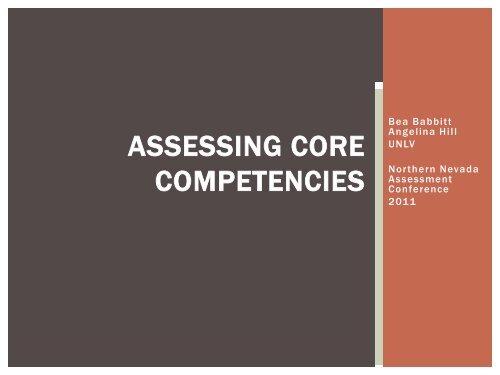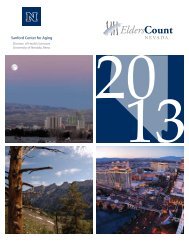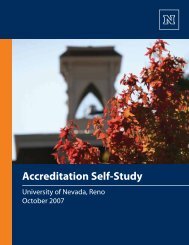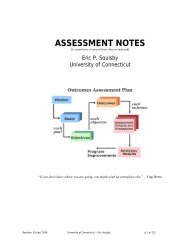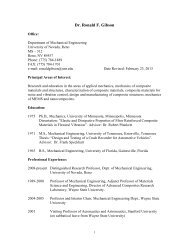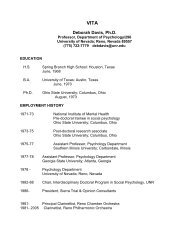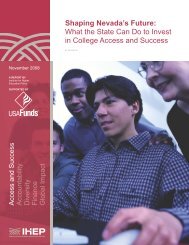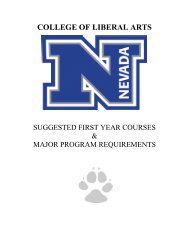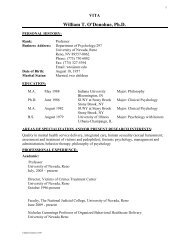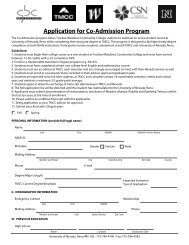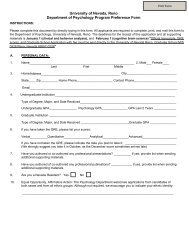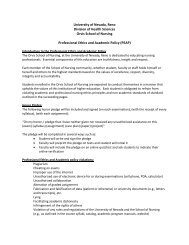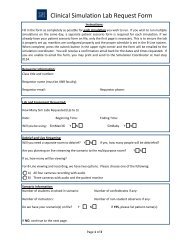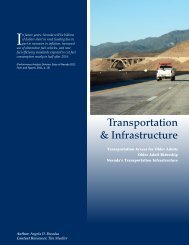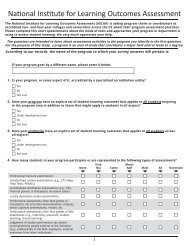Assessing Core Competencies - University of Nevada, Reno
Assessing Core Competencies - University of Nevada, Reno
Assessing Core Competencies - University of Nevada, Reno
You also want an ePaper? Increase the reach of your titles
YUMPU automatically turns print PDFs into web optimized ePapers that Google loves.
ASSESSING CORE<br />
COMPETENCIES<br />
Bea Babbitt<br />
Angelina Hill<br />
UNLV<br />
Northern <strong>Nevada</strong><br />
Assessment<br />
Conference<br />
2011
ASSESSING CORE COMPETENCIES<br />
• Knowledge & skills typically associated with general<br />
education<br />
• Valued by many programs<br />
• Critical Thinking<br />
• Communication<br />
• Global/multicultural
ASSESSING CORE COMPETENCIES<br />
• Learning objectives in the major <strong>of</strong>ten include core<br />
competencies<br />
• Academic Assessment Advisory Committee reviewed learning<br />
objectives <strong>of</strong> their majors<br />
• Effective communication skills (All)<br />
• Inquiry and critical thinking skills (All)<br />
• Knowledge <strong>of</strong> the natural sciences, social sciences and fine arts (All)<br />
• Skills and values related to citizenship and ethics (A few)<br />
• Skills and values related to global/multicultural competencies (A few)
http://www.aacu.org/leap/vision.cfm
COMMON LEARNING OUTCOMES<br />
Intellectual Skills/Ability<br />
Writing skills 77%<br />
Critical thinking 74%<br />
• Common learning<br />
outcomes by institution<br />
Quantitative reasoning 71%<br />
Oral communications 69%<br />
Intercultural skills 62%<br />
Information literacy 59%<br />
Ethical reasoning 59%<br />
Civic engagement 53%<br />
• AAC&U report:<br />
Trends and Emerging<br />
Practices in General<br />
Education by Hart Research<br />
Associates (2009)<br />
Application <strong>of</strong> learning 52%<br />
Research skills 51%<br />
Integration <strong>of</strong> learning 49%<br />
https://www.aacu.org/membership/documents/2009MemberSurvey_Part2.pdf
http://www.aacu.org/value/rubrics/
ASSESSING CRITICAL THINKING<br />
• Critical Thinking Assessment Test (CAT)<br />
• Designed to assess and promote critical thinking & realworld<br />
problem solving skills.<br />
• Skills were identified that were most valued by faculty and<br />
employers.<br />
• Short answer essay questions with faculty-led scoring<br />
sessions
ASSESSING WRITING<br />
• Cognitive Level and Quality Writing Assessment Instrument<br />
(CLAQWA)<br />
• Online system for assessing writing skills across an institution’s<br />
curriculum consistently.<br />
• Provides faculty with a flexible rubric that can be adapted to most<br />
written work.<br />
• Provides instructional feedback that can include comments.<br />
• Supports peer review to enhance students’ writing & critical thinking
http://claqwaonline.com/
http://www.salgsite.org/
ASSESSING GLOBAL COMPETENCIES<br />
• Global Perspective Inventory (GPI)<br />
• Provides a self-report <strong>of</strong> a person’s perspectives in<br />
three dimensions <strong>of</strong> global learning and<br />
https://gpi.central.edu/<br />
development<br />
Cognitive<br />
Interpersonal<br />
Intrapersonal
ASSESSING GLOBAL COMPETENCIES<br />
Cognitive Domain Scales<br />
Knowing. Degree <strong>of</strong> complexity <strong>of</strong> one's view the importance <strong>of</strong> cultural context in<br />
judging what is important to know and value.<br />
Knowledge. Degree <strong>of</strong> understanding and awareness <strong>of</strong> various cultures and their<br />
impact on our global society and level <strong>of</strong> pr<strong>of</strong>iciency in more than one language.<br />
Intrapersonal Domain Scales<br />
Identity. Level <strong>of</strong> awareness <strong>of</strong> unique identity and degree <strong>of</strong> acceptance <strong>of</strong> one’s<br />
ethnic, racial, and gender dimensions <strong>of</strong> one’s identity.<br />
Affect. Level <strong>of</strong> respect and acceptance <strong>of</strong> cultural perspectives different from<br />
one’s own and degree <strong>of</strong> emotional confidence when living in complex situations.<br />
Interpersonal Domain Scales<br />
Social Interactions. Degree <strong>of</strong> engagement with others who are different from<br />
oneself and degree <strong>of</strong> cultural sensitivity in living in pluralistic settings.<br />
Social responsibility. Level <strong>of</strong> commitment to interdependent living and the<br />
"common good."
ASSESSING CORE COMPETENCIES WITH<br />
PROGRAM DEVELOPED TOOLS<br />
Program Developed Tools<br />
Frameworks vary<br />
All show field-specific focus<br />
Multiple tools used<br />
Multiple levels <strong>of</strong> analysis<br />
Goal: identify areas for improvement<br />
Today’s examples:<br />
Elementary Education: Multicultural, Communication, Critical Thinking<br />
Nursing: Communication<br />
Microbiology: Critical Thinking
ASSESSING CORE COMPETENCIES WITH<br />
PROGRAM DEVELOPED TOOLS<br />
Elementary Education Field Experiences<br />
Standards-based<br />
Field-specific focus: Diverse learners, communication, reflection<br />
Tool: Field experience observation rubric<br />
Observers: <strong>University</strong> supervisor and supervising teacher<br />
Program-wide developmental analysis: Practicum 1, Practicum 2, Student Teaching<br />
Nursing<br />
Standards-based<br />
Field-specific focus: Basic and therapeutic communication; nonverbal<br />
Tools: Exit Survey, Clinical Evaluations<br />
Observers: <strong>University</strong> supervisor and clinical supervisor<br />
Expectation: % <strong>of</strong> students evaluated as “performance is safe and competent.”<br />
Microbiology Lab<br />
Faculty content expertise<br />
Field-specific focus: Logical, flow chart representation<br />
Tool: Term paper grading rubric<br />
Graders: Faculty and graduate assistant
ASSESSING CORE COMPETENCIES<br />
References<br />
Halonen, J. S., Bosack. T., et al. (2003). A rubric for learning, teaching, and assessing scientific<br />
inquiry in psychology. Teaching <strong>of</strong> Psychology, 30 (3), 196-208.<br />
Martell, K., & Calderon, T. (Eds.) (2005). Assessment <strong>of</strong> student learning in business schools:<br />
Best practices each step <strong>of</strong> the way. Assessment in the disciplines, Volume 1.<br />
Tallahassee, FL: Association for Institutional Research and AACSB International.<br />
Noblitt, J., Vance, D. E., & DePoy Smith, M. L. (2010). A comparison <strong>of</strong> case study and<br />
traditional teaching methods for improvement <strong>of</strong> oral communication and critical<br />
thinking skills. Journal <strong>of</strong> College Science Teaching, 39 (5), 26-32.<br />
Internet Resources for Higher Education Outcomes Assessment<br />
http://www2.acs.ncsu.edu/UPA/assmt/resource.htm


